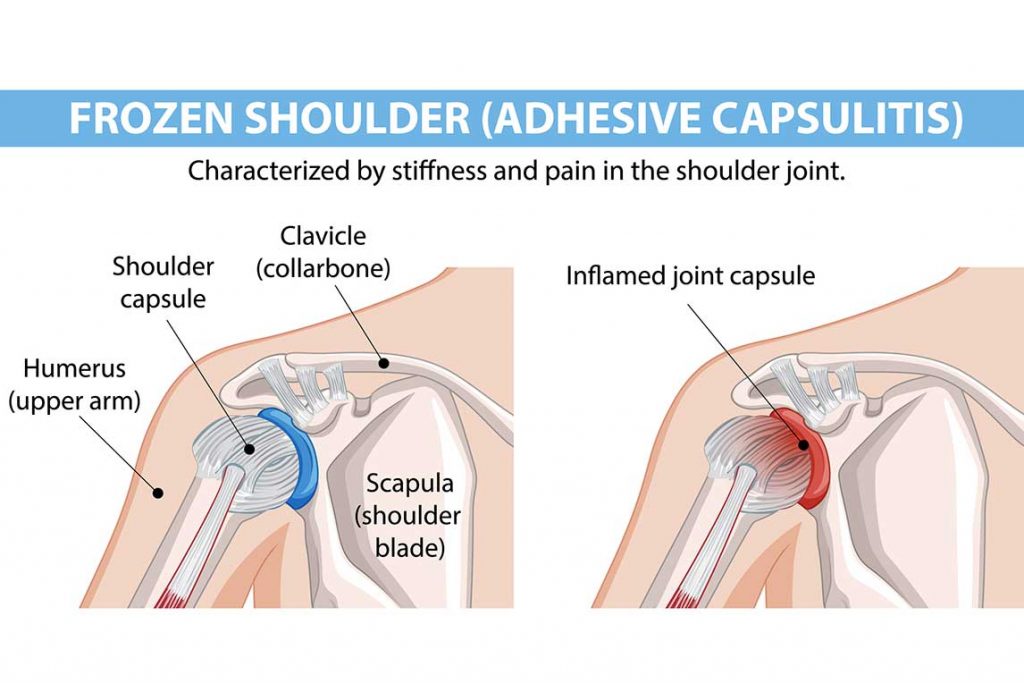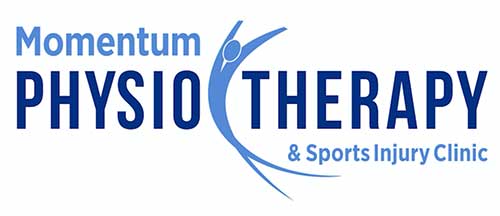Frozen shoulder (adhesive capsulitis) is a progressive condition that affects the shoulder joint, causing pain, stiffness, and restricted movement. If you’ve been wondering “how to fix frozen shoulder” or how long recovery takes, you’re not alone. At Momentum Physiotherapy in Maple Ridge, we treat many patients dealing with frozen shoulder, and the good news is: with the right care, recovery is possible.
What is Frozen Shoulder?
With frozen shoulder, the joint capsule (the connective tissue surrounding the shoulder joint) becomes inflamed, thickened, and stiff. Over time, this reduces joint space and limits normal motion. Without treatment, it may take 1–3 years to improve.
Common Causes & Risk Factors
Understanding what causes frozen shoulder is key to knowing how to fix it.
Here are some common causes:
- Immobilization: Post-injury or surgery, when the shoulder isn’t moved enough.
- Medical Conditions: Diabetes (up to 20% prevalence), thyroid disorders, heart disease, Parkinson’s disease, stroke.
- Shoulder Inflammation: From bursitis, tendinitis, or rotator cuff injuries.
- Overactive Healing Response: Excess scar tissue forms in the capsule.
- Hormones & Gender: More common in women 40–60, especially around menopause.
- Idiopathic (Unknown Cause): Possibly genetic or autoimmune.

How Frozen Shoulder is Diagnosed
Diagnosis is usually clinical, based on history and physical exam. Imaging (like X-ray or MRI) helps rule out other causes and may show capsular thickening.
Stages of Frozen Shoulder
Frozen shoulder develops in three stages:
1. Freezing Stage (Painful Phase) – 6 weeks to 9 months
- Increasing pain, worse at night.
- Stiffness begins, especially in external rotation, abduction, and flexion.
- Movement becomes painful.
2. Frozen Stage (Stiff Phase) – 4 to 12 months
- Pain may decrease, but stiffness worsens.
- Severe loss of range of motion.
- Weakness from reduced shoulder activity.
3. Thawing Stage (Recovery Phase) – 6 months to 2 years
- Gradual return of shoulder mobility.
- Pain continues to improve.
- Function slowly returns to normal.
How Long Does Frozen Shoulder Last?
Recovery time varies depending on age, health conditions (like diabetes or thyroid disorders), and treatment choices. Without care, frozen shoulder can last up to 3 years. With physiotherapy, recovery is usually faster and function improves sooner.
How to Fix Frozen Shoulder: Treatment Options
If you’re wondering “how do I fix frozen shoulder?”—here are the most effective options:
✅ Conservative Care
- Physiotherapy: Stretching, range-of-motion exercises, manual therapy, and pain-relief modalities.
- NSAIDs: For inflammation and pain.
- Corticosteroid injections: To reduce inflammation in the early stages.
✅ Interventional Options (for severe cases)
- Joint distension (hydrodilatation): Expanding the capsule with fluid.
- Manipulation under anesthesia (MUA): Breaking up adhesions while under sedation.
- Arthroscopic capsular release: Surgical removal of scar tissue.
How Physiotherapy in Maple Ridge Helps Fix Frozen Shoulder
At Momentum Physiotherapy, we personalize frozen shoulder treatment to your stage of recovery:
- Gentle stretching and mobility work in the freezing stage.
- Targeted exercises and manual therapy in the frozen stage.
- Strengthening and functional rehab during the thawing stage.
Physiotherapy not only shortens recovery time but also helps restore mobility and reduce long-term stiffness.
Takeaway: How to Fix Frozen Shoulder
Frozen shoulder can be frustrating, painful, and slow to resolve—but with proper treatment, you don’t have to wait years to regain function.
If you’re searching for “how to fix frozen shoulder in Maple Ridge”, the team at Momentum Physiotherapy is here to help. Book an appointment today by calling 604 459 2223 and start your recovery journey.

